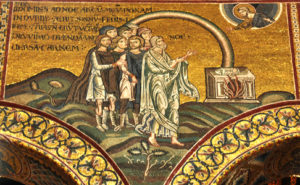1 March OS 2018: Wednesday of the Fourth Week of Lent; S. Eudokia, Nun and Martyr; S. David of Wales; S. Agapios of Vatopedi
The first reading at Vespers today is Genesis 9:18 – 10:1.
Noah curses Ham for insulting his father, and all of Ham’s posterity are cursed as well. There are three realities here that today many wish to deny:
Divinely-established hierarchy: God places some men over others, the most primordial example being that of placing the father over his family. The deluded slogan of the French Revolution, the catastrophe that inaugurated the current reign of demonic insanity, combines “equality” with “fraternity,” but this is self-contradictory, because without hierarchy there is no love, only the competition of “equals.” No one is responsible for anyone else, and no one has to obey anyone else. In practice of course, this results in the evil anti-hierarchy of “might makes right, the “law of the jungle,” and “survival of the fittest.” Another word for such a condition is “hell.”
The duty of filial piety: This comprises not only the affection but also the reverence of children toward parents, a reverence the children owe even to bad parents. The commandment God will later give to Moses does not create a new obligation but rather enshrines what was known from the beginning: “Honor thy father and thy mother: that thy days may be long upon the land which the LORD thy God giveth thee.” Filial piety brings a blessing upon one’s life; filial impiety brings a curse. In his last and greatest novel, Brothers Karamazov, Dostoevsky uses the image of a parricide, one who murders his father, to illustrate the essence of nihilism, which is the worship of self-will that leads to eternal death.
The duty to shield the eyes from evil: Ham’s duty was not only to cover his father’s nakedness out of filial piety but also to cover his own eyes and to be silent regarding what he had inadvertently witnessed. There are times when our duty requires the accusation of evil and to be silent is a sin. A great deal of the time, however, we indulge in looking upon and speaking about evil that is none of our business and about which we can do nothing, the result being that we both coarsen ourselves and spread the effect of the evil we profess to abhor. Contemporary man has completely lost the very concept of the obscene – that there are some things that should not be seen or heard by others. The word obscene comes from the Latin o-, ob-, which means, in this context, “away from,” and scena, “stage,” i.e., the stage in a theater. There are many things, due either to their especial sacredness or especial evil, that should not – must not – be heard, seen, portrayed, or spoken of in public. They must remain “offstage.” A society that forgets this is doomed to degradation and dissolution.
How do we recover the pietas of our fathers in the Faith? As a first step, we must turn off the input of filth from the world around us and immerse ourselves in that which is good: good reading, good art, and good music. We find this first of all in the Church and Her sacred writings, art, and chant. We find this secondly in the healthiest and best non-liturgical writing, art, and music of Christian civilization. It is all there for us to partake of it. We simply have to make the choice.
As a second step, let us refuse to speak of evil things except when called upon to do so by the duties entailed in our station in life, and even then only to say what is truly required to those who truly need to know.
As a third step, let us pray with tears for the Lord to show us the way out of the sacrilegious burlesque that constitutes postmodern public life, and for the wisdom and strength to build an ark in which we can ride the waves unsullied over the sea of sewage which passes for contemporary culture.
Dear Father Noah, common father to us all, pray God for us.

